Net zero commitments have filled our newspapers and news feeds over the past 12 months – and they’re fast becoming an expectation for businesses.
Policy-makers are putting net zero at the heart of their regulation, with many countries setting net zero targets by 2050, and recent commitments from the US to reduce GHG pollution by 50% by 2030 and by 55% by 2030 from the EU. Investors are making big commitments on net zero as well, which will require similar levels of commitment from their portfolio companies.
Companies are already responding with public net zero commitments – and are keen to garner reputational benefit at the same time.
More than a fifth of the world’s 2,000 largest listed companies have now made net zero commitments. One of the leading net zero coalitions, Race to Zero, boasts 33 cities, 31 regions, 3,067 businesses, 173 of the biggest investors, and 622 Higher Education Institutions committing to net zero by 2050 – and that’s just the latest count.
“Sentiment about net zero announcements is shifting from praise to skepticism.”
But sentiment about net zero announcements is shifting from praise to skepticism, presenting challenges to businesses who are planning to make net zero commitments.
While the conversation on net zero is very active, this makes it even more difficult to stand out from the crowd –there’s less and less “new” news in net zero.
And while the first movers gained advantage, skepticism now dominates media coverage related to these kinds of announcements, which are often accompanied by accusations of greenwashing and speculation surrounding whether or not the targets laid out are feasible.
“For many companies net zero commitments can become reputational liabilities, rather than reputational assets.”
For many companies net zero commitments have the potential to damage reputation, even when announced with the best intentions.
We’ve identified five risks to a net zero announcement and what businesses can do to ensure that net zero commitments are reputational assets, rather than reputational liabilities.
1. Lack of detail
What signals credibility
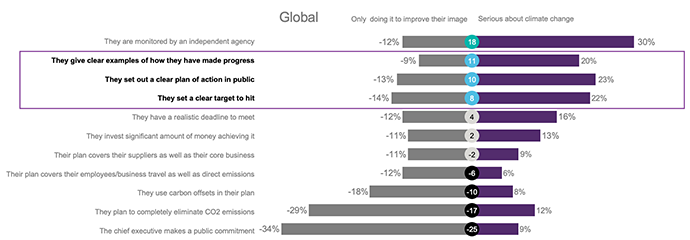
On the road to net zero, having a plan matters. Kekst CNC research found that the public reacts more positively to net zero commitments that set out “a clear plan of action” and include “clear targets to hit”, with these measures seeing more people say it means a company is serious about climate change. On the other hand, companies that choose not to share details of roadmaps put in place to get to net zero find themselves vulnerable to cynicism from investors and members of the public.
Companies must communicate their plans – and be ready to demonstrate what they have already done. The survey found that “clear examples of progress” were one of the most powerful ways to signal credibility.
What businesses can do
- Be as specific as possible, provide detailed milestones and update these regularly. For an announcement, this means setting out the scope and parameters of a commitment.
- If no detail is available, define a timeline by when you will deliver metrics. And acknowledge that you are only at the beginning of the journey, with much work to do.
2. Perceived or actual dissonance with business practices
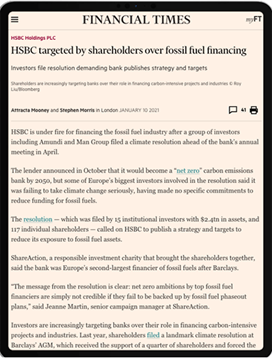
Companies are often criticized when ambitions are perceived to be at odds with business realities. When companies ignore points of dissonance, their commitments are often pulled apart by members of the public and journalists alike.
This is amplified against a backdrop of distrust in corporations. Glossing over the difficult parts, and not addressing the gaps where there aren’t existing solutions, can have a huge reputational impacted against a backdrop of distrust in corporations.
Glossing over the difficult parts, and not addressing the gaps where there aren’t existing solutions, can have a huge reputational impact.
What businesses can do
- Openly acknowledge areas of dissonance to getting skeptics on board and demonstrate transparency.
- Proactively address how you are managing areas of the business that contradict a net zero commitment, in order to lead a more nuanced conversation.
- Be willing to be open, vulnerable and focus on the toughest and unknown parts that still need solutions.
3. The ‘net zero’ language barrier
Language that works:
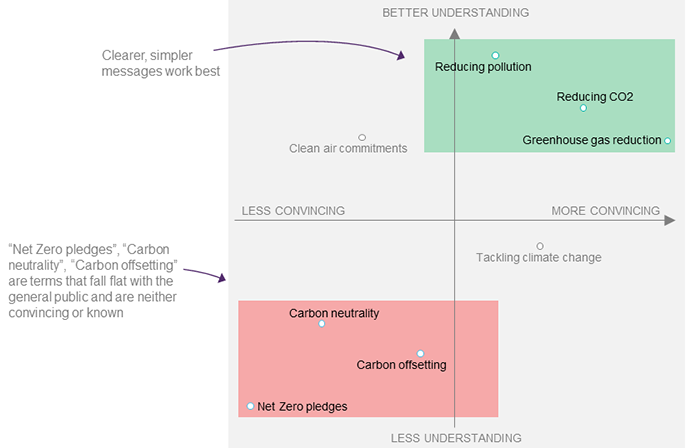
General understanding of net zero is low. Research conducted by Kekst CNC found that only 42% of people understand what “net zero” is, making it a term that relatively few can connect with. But the implication of this goes further – 60% of the public doesn’t consider the term “net zero” to be a credible signal of intent.
Instead the public understands and is more convinced by language and issues that have a more tangible impact on lives –i.e. pollution, air quality.
What businesses can do
- Reposition your communications away from the technical and trendy language typically associated with net zero.
- Instead leverage language that the public and media better understand to make your discussion more relevant. Terms like “reducing pollution” work best, in contrast with more complex terms such as “carbon neutrality” and “carbon offsetting” that are neither convincing nor known.
4. Relying on CEO statements alone
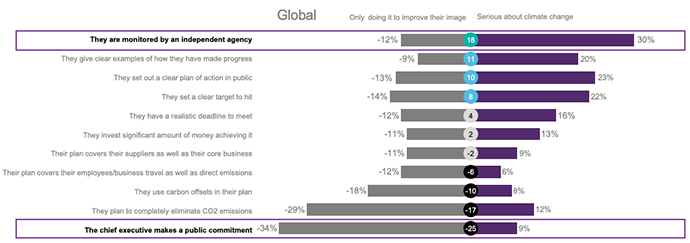

When announcing net zero commitments, it is common practice to position CEOs and senior leaders at the forefront of announcements concerning net zero targets.
But Kekst CNC research has shown that only 9% of people believe that when a chief executive makes a public commitment to net zero this means the company is serious about climate change. This compares with over a third who believe net zero commitments fronted by CEOs are being used to improve a company’s image.
It’s an important way to show seriousness but credibility comes through other means. The most powerful signal of credibility are net zero targets that are monitored by independent third parties.
What it means for businesses
- Leverage third parties as advocates for your work externally and equip them to communicate proactively on your behalf.
- Use your employees as advocates for your net zero ambition. Put them front and center externally and empower them to participate in your journey – in both the achievements and the challenges you face along the way.
5. Unrealistic expectations and arrogance
A sense of arrogance, or praising the business for doing something that is increasingly an expectation, is an easy pitfall to fall into. Against a backdrop of distrust in corporations, glossing over the difficult parts, and pretending you have all the answers can have a huge reputational impact.
The public is sensitive to net zero commitments that seem unrealistic. Almost a third of those surveyed indicated that plans to “completely eliminate CO2 emissions” would make them think a net zero commitment is less credible.
People are keeping tabs on who should foot the climate bill. When asked who should shoulder the most responsibility for addressing climate change, 57% of the public identified “businesses that emit large amounts of CO2”. This compared with only 27% who identified “businesses generally”.
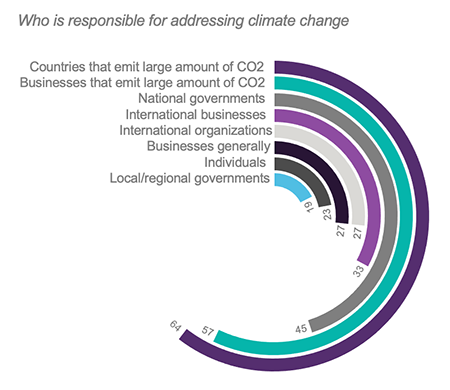
What it means for business
- When it comes to communicating about net zero, acknowledge the efforts and ambitions of others to position yourself as part of the bigger picture effort required to tackle a challenge of this scale.
- Don’t pretend you have all the answers –or that your ambition alone is enough to solve this.
- Rather than making unrealistic claims that are beyond your capabilities, focus on a clear plan towards an ambitious but achievable target. This means being open and vulnerable and focus on the toughest and unknown parts that still need solutions.
The data points in this article were sourced from polling conducted by Kekst CNC, featuring a nationally representative sample of 1,000 adults from the UK, US, Germany, Sweden, France and Japan. Fieldwork took place between 11-21 February 2021.
ESG and Sustainability at Kekst CNC
We take an integrated approach to ESG and sustainability, embedding expertise into all our client work. This requires a rigorously commercial approach, focusing only on critical areas: what’s financially material to your business and what’s central to its operation. We start with the data to get a clear view of the issues – not just perception and speculation. Our insight-driven approach enables us to create compelling and credible stories, rooted in the business.
Our experienced team supports businesses at every stage of their sustainability journey to generate value, drive reputational reappraisal and demonstrate leadership. Our team is stronger for being integrated into all our client services, ensuring our advice is always anchored in your commercial priorities.
We support clients to:
- Respond to critical social and environmental issues that impact your license to operate, such as shareholder activism and reputational crises
- Integrate and unify sustainability in all communications to demonstrate the full value of your business
- Navigate the ESG reporting landscape to identify what’s most important to your stakeholders
- Establish leadership in sustainability through campaigns and signature initiatives


